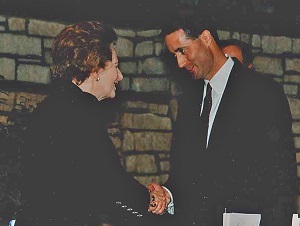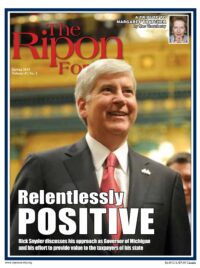
I have to admit that, at the time, I was disappointed.
I had been given the honor of introducing Margaret Thatcher at a large charity event in Amarillo, Texas, several years after she left office. I worked harder on that introduction than on any other speech I had ever given, trying to get each word just right. My goal was not really to impress her or even the audience, but just to try to be adequate to the occasion of presenting this truly historic figure.
I gave my introduction; she said a few gracious words in reply and then proceeded into her remarks. Like most of the audience, I eagerly awaited stories of standing up to British labor unions, sending the military to reclaim the Falklands, or consulting with President Reagan on overcoming communism. I also wanted to hear some of her personal story — how she fought against the odds to rise to the top of the British political system and become a world statesman.
Instead, we got a very different kind of speech. It revolved mostly around the importance of the rule of law and the reasons that nourishing and protecting the rule of law is fundamental to our civilization. It seemed closer to a law professor’s lecture than the reminiscences of a statesman. But as I think back, it was very much in keeping with her character.
Margaret Thatcher was not one to live in the past. She had a relentless drive forward, toward what ought to be.
Margaret Thatcher was not one to live in the past. She had a relentless drive forward, toward what ought to be. And she was pressing upon that Texas audience the necessity of maintaining and nourishing part of the foundation of Western society for the future. Her career was grounded in certain bedrock principles, one of which was the importance of the rule of law. In fact, her authorized biographer, Charles Moore, has written, “In private political conversation, I think she used the phrase ‘the rule of law’ more often than any other.”
Her faith in the rule of law reflected her confidence that ordinary citizens could, if given the opportunity, do remarkable things for themselves and for their country. The rule of law, rather than the arbitrary, capricious rule of men, was necessary to give them that opportunity to make of their lives what their energy and talents allowed.
And she was relentless in fighting against those forms of government that squashed opportunity, like communism and socialism. One biographer contends that “what she managed to do, more effectively than any other politician in history,” is argue that socialism is not only inefficient but immoral.
It was that drive forward and the principles she espoused that make Margaret Thatcher more than an historic figure. Her personal qualities and the principles she advocated enhance and enlarge the legacy she leaves, beyond even her considerable achievements. And her character and her conviction will inspire generations to come as they struggle with the latest manifestations of attempts to limit human freedom.
…her character and her conviction will inspire generations to come as they struggle with the latest manifestations of attempts to limit human freedom.
Speaking to a Conservative Party Conference in 1976, she said: “As I look to our great history and then at our dismal present, I draw strength from the great and brave things this nation has achieved. I seem to see clearly, as a bright new day, the future that we can and must win back. As was said before another famous battle: ‘It is true that we are in great danger; the greater therefore should our courage be.’”
Many generations will draw strength from the great and brave things Margaret Thatcher achieved, and they will also be lifted by the principles by which she stood and by the example that she set.
Mac Thornberry represents the 13th Congressional District of Texas in the U.S. House of Representatives. He serves as Vice Chairman of the Armed Services Committee, and is a member of the Intelligence Committee.




